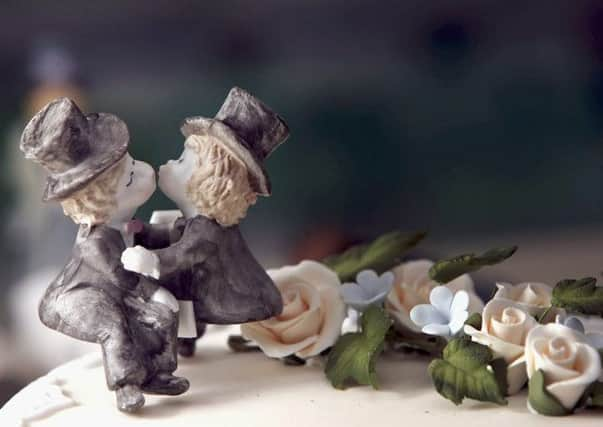Same-sex marriage: Church charity status loss fear


The Scottish Parliament is currently considering the Marriage and Civil Partnership (Scotland) Bill, with MSPs meeting tomorrow to discuss the proposed legislation.
Church figures have appealed to Health Secretary Alex Neil to make amendments to the Bill before it reaches the next stage.
Advertisement
Hide AdAdvertisement
Hide AdThe terms discussed at Holyrood would see religious bodies have to opt in to perform same-sex marriage ceremonies and protection would be offered to individual celebrants who feel it would go against their personal faith to carry out gay weddings.
The signatories of the letter say they are concerned that the Church’s charitable status could be at risk should they be unwilling to marry same-sex couples.
They said: “We are greatly concerned that following any change in the law some public bodies might refuse to enter into any partnerships or arrangements with a church which publicly states its opposition to same-sex marriage.
“We would therefore ask that the Scottish Government amends existing charity law so as to specify that holding or expressing the view that marriage is only between a man and a woman cannot be cited as a ‘disbenefit’ when administering the charity test.
“We would also support a clear principle of reasonable accommodation in ensuring churches and religious charities that are explicitly opposed to same-sex marriage can continue to openly provide services with public bodies, and to likewise make use of public facilities.”
The group wants to ensure there are safeguards for individuals and organisations who oppose changes to the existing marriage laws, particularly those working in the public sector.
The letter from ministers, pastors and elders from congregations across Scotland asks: “Will people working in the public sector who express the view that marriage can only ever be between a man and a woman be disciplined, or even have their suitability for employment questioned, on the basis that their views are deemed incompatible with their employer’s commitment to equality and diversity?
“Likewise, will young Christians seeking employment in professions such as teaching or the police, find themselves at a disadvantage in the recruitment process should they express their opposition to same-sex marriage?
Advertisement
Hide AdAdvertisement
Hide Ad“In the Policy Memorandum accompanying the Bill, it states that the Scottish Government respects the current view of marriage. We would urge the Government to have the courage of its convictions and to explicitly state on the face of the Bill that this view is indeed worthy of respect.
“This would provide us with some reassurance that public sector workers who disagree with same-sex marriage will indeed have their view respected by their employers.
“We would also welcome a specific amendment to the Equality Act clarifying that compliance with the Public Sector Equality Duty (PSED) means ensuring no person suffers any detriment because they express their belief in marriage as currently defined.”
MSPs voted in favour of introducing same-sex marriage legislation in November.
They will have a chance to agree any amendments to the Bill in a stage 3 debate tomorrow, before deciding whether to pass it into law.
The Equality Network has meanwhile described tomorrow’s vote as a positive milestone in Scottish history.
The organisation said: “Thirty-four years after Scotland decriminalised homosexuality in 1980, the Scottish Parliament will have the historic chance to remove this last major piece of sexual orientation discrimination from Scots law and secure legal equality for lesbian, gay and bisexual people.”
SEE ALSO